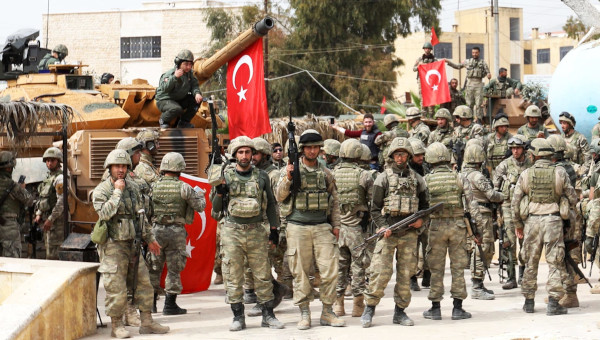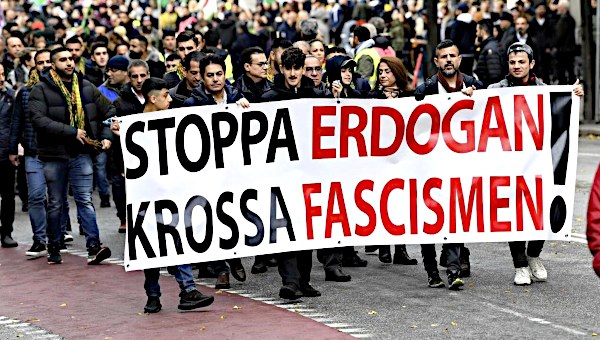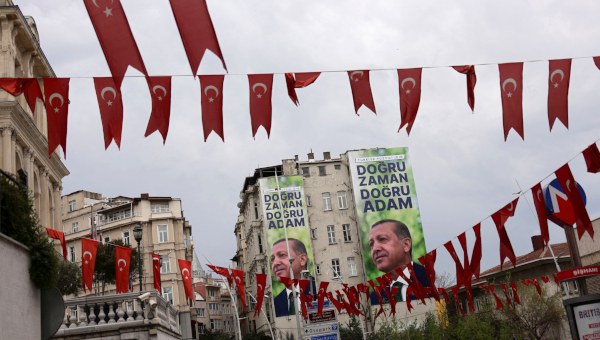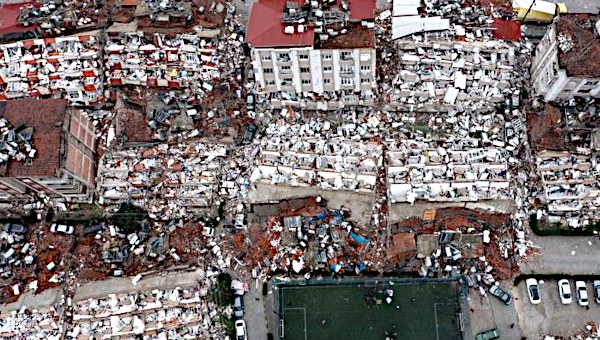So it has come to this! As the whole world is aware, the Turkish government of Recep Tayyip Erdogan has taken the step of banning Twitter! The government is probably sounding the reaction of the public and planning to ban YouTube as well, since that has been the site where all the wiretapped conversations have been posted. These leaked recordings of conversations between the prime minister, other government members, a motley of prominent capitalists, and leading journalists have, in our opinion, definitively demonstrated the depth of the corruption, degeneration, manipulation of the judiciary and heavy-handed interference in the day to day functioning of the media the government has been engaged in for years now. Thus the Twitter decision is only the last link to date in a long chain of violations of the most basic democratic rights. However, its sheer brazenness signals a qualitative change and should not be underestimated.
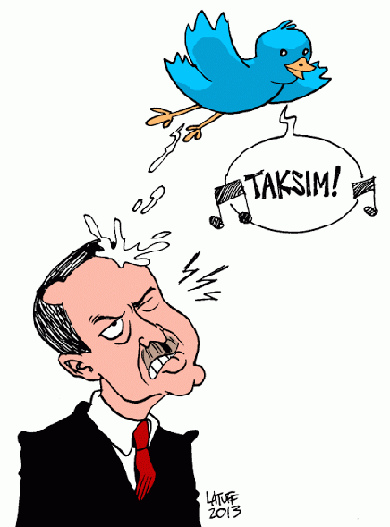
This move is also the apex of a series of measures adopted by the AKP (Justice and Development Party) government for the last three months. Ever since the earth-shaking corruption probe of 17 December 2013, in which four government ministers were indicted for having engaged in graft and bribe along with their sons and a host of capitalists, in particular contractors mouth-fed with ground rent flowing from the fountains of the endless urban transformation projects of the recent years, the government’s sole activity has practically become the blackening of evidence and the whitewashing of revealed cases of corruption. Public prosecutors that had been trying to look into these cases have been removed from their posts. Police officials who had been carrying out their duties have been sidelined. Basing itself on the so far subservient AKP majority, the government has rushed through parliament laws that make it possible for it to control the judiciary and to ban internet traffic (the Twitter ban case is the first spectacular fruit of that law) and is preparing another piece of legislation to grant unprecedented powers to MIT, the national intelligence agency controlled by its henchmen. But the leaked tapes posted on YouTube have caused immense damage to the credibility of the government in the eyes of the wider public. The veracity of some of these was confirmed by Erdogan himself, but the most lethal cassette was dismissed as “montage.” In this audio tape, Erdogan is heard, in a succession of conversations taped on the very day when his ministers were being hounded for their part in the corruption, urging his son to stash away stunning sums of money, reaching up to a billion dollars, kept illicitly in their Istanbul home.
All this has surely taken its toll on Erdogan’s prestige internationally and at home, but public opinion polls suggest that the pious conservative majority that has granted him landslide victories in election after election in the past has still not given up on him. So we are witnessing a sight in which a once powerful political leader is desperately swimming in an open gutter to what he believes is salvation on the shores of the local elections of 30 March. In effect he has such great confidence in the elections as panacea that he had only a week ago declared that his government would shut down Twitter and YouTube after the elections. However, an impending catastrophe has obviously forced his hand to move earlier. That catastrophe would be one or several cassettes, this time video tapes as well as audio tapes, concerning variously the alleged cold-blooded murder of a political rival ordered by Erdogan, visual evidence that hundreds of millions of dollars were in fact stashed away on 17 December and/or visual evidence of sexual behaviour on the part of either Erdogan himself or his ministers impossible to stomach by the devoutly Muslim electorate of the AKP.
The Politics Behind the Thriller
All this filth has been revealed as a result of the irreversible break between the two major pillars of the Islamic historical bloc that has ruled over Turkey for a dozen years. Fethullah Gulen, an imam in exile in Pennsylvania, and his community of disciples, wielding an international empire of missionary schools, as well as businesses, a strong media presence, and considerable influence through its schools and boarding houses on pious youth at the domestic level, have now abandoned Tayyip Erdogan and the AKP. Throughout the years of bloodless civil war that pitted the newly rising Islamic bourgeoisie against the older, more established pro-Western secular wing of the same class, Gulen had formed an informal coalition with Erdogan. In return for the political support he extended to the AKP, he had spread his net far and wide in the judiciary, the police force and possibly the armed forces. The two partners fell out because they represent different strategic choices: while Erdogan comes from the National Vision movement of Erbakan, the historic leader of political Islam in Turkey, but moved to a tactical alliance with the U.S. and the EU especially in the first years of his rule, Gulen has historically represented a different kind of orientation, making a strategic alliance with the U.S. and Israel the pillar of his quest for power. We had drawn attention to the potential danger this posed for the Islamic historical bloc in power on this very web site in an article on Middle Eastern politics in 2010 (“The Other Fateful Triangle”) in the context of a discussion on the Freedom Flotilla sailing toward Gaza, but raided by the Israeli military. This is what we said:
“So it is clear that the Erdogan government is constitutionally unfit for a full-scale defence of Palestinian rights. But even if Erdogan himself and his co-thinkers were prepared to break completely with Israel and hence the U.S., the nature of the Islamist movement in Turkey would not allow them to go forward. In a move of extreme significance, Fethullah Gulen, the leader of the religious congregation that was alluded to above, talked to the Wall Street Journal days after the Israeli assault on the flotilla. Gulen condemned the whole Freedom Flotilla enterprise, and defended Israel’s right to decide what goods should be allowed into Gaza. And he went on to chide the ‘defying of authority’ on the part of the Turkish actors in the drama (all this in a newspaper controlled by sworn enemies within the U.S. establishment of the AKP). This read as a real cold shower for Islamists of all stripes in Turkey, and clearly implies that Gulen will withdraw his support from behind the AKP should Erdogan and co-thinkers opt for a break with Israel and the USA. This would, in all probability, reduce the AKP to a shadow of its former self.”
The AKP has not had “a break with Israel and the USA,” at least not fully. But it is a secret around the block that, for a host of reasons which would take us too far away from the central topic of this article, the U.S., through the auspices of its ambassador to Turkey, Francis Ricciardone, has set out to concoct an alternative to Tayyip Erdogan composed of a motley of forces ranging from the present president of the republic, Abdullah Gul, through the historic party of the secular wing of the bourgeoisie, the Republican People’s Party (CHP), to sectors of, if not the entire, fascist movement. Gulen happens to be seen as the éminence grise behind this new coalition! The forces that leaked the lethal wiretaps to the internet are, in all probability, Gulen’s men who had formerly been brought to strategically important posts in the police force and the judiciary.
The fact that the U.S. sides with Gulen and his cohort in this melee does not imply that Erdogan is entitled to wear the mantle of “anti-imperialism,” although he does make noises in that direction, complaining of his pet enemy “the interest rate lobby,” an oblique reference to an alliance between Wall Street and the secular wing of the Turkish bourgeoisie, insinuating U.S. meddling in Turkish domestic affairs and calling his struggle against the “putschists” of Gulen a “second war of independence,” with reference to the first one waged in the early 1920s by Mustafa Kemal Ataturk, the founder of the republic.
Despite this posturing, it is immensely difficult, if not impossible, for Erdogan to challenge the U.S. and the EU. Only recently, on the vital question of Ukraine the AKP government silently sided with the U.S. and the EU against Russia. Turkey’s potential role in this conflict cannot be exaggerated: the opening or otherwise of the straits of the Bosphorus and the Dardanelles to NATO warships may prove to be a vital element in deciding the outcome of this potentially explosive dispute. It is really not Erdogan who has clearly adopted an anti-U.S. position. It is rather the U.S. that has opted for an anti-Erdogan orientation. And this not because Erdogan really poses a danger for the U.S., but because he is no longer the unchallengeable leader of one of the key countries of the region. His authority and prestige have been irredeemably tarnished by the people’s rebellion that goes by the name of Gezi Park in summer 2013. Erdogan had been so popular with the imperialist leaders because he promised and delivered economic and political stability for Turkey in a region where that is the scarcest commodity. Since the popular revolt of summer 2013, that reputation has been razed to the ground. All his allies have started to abandon Erdogan. The U.S. has simply decided not to bet on the losing horse.
The Emergence of Three Fronts
All in all, behind the suspense lies a political struggle unto death between two factions of the Islamic historical bloc, to which corresponds a rift between two wings of the Islamic bourgeoisie organized in two different employers’ organizations, called MUSIAD for the AKP supporters and TUSKON for the Gulen supporters. This is now a civil war of the bourgeoisie within the earlier civil war. The realignment of forces will be very painful. And the decision made by the pro-Western secular wing of the bourgeoisie, which itself wields the strongest employers’ association, TUSIAD, and of the armed forces will probably be decisive.
In the initial stages of the conflict the battle lines seemed pretty clearly drawn. As against Erdogan and all his partisans who have gained so much during his decade of rule that they cannot bring themselves to parting ways with him, there was formed, at the social level, the alliance of TUSKON, the Gulenist bourgeoisie, with TUSIAD, the pro-Western secular one. This corresponded, at the political level, to the earlier mentioned coalition between the CHP, the Gulenists, Mustafa Sarıgul (a strongman controlled by some of the major pro-Western-secular groups of finance-capital who is now candidate for mayor of Istanbul), and elements of the right breaking with the AKP. This coalition is meant to be so comprehensive that, given the appropriate circumstances, it will eventually move to include sectors of the AKP breaking with Erdogan, starting with the party number two, Abdullah Gul, currently president of the republic. The part the fascist movement is expected to play in this coalition is something yet to be seen. Three months into the crisis, the political coalition is still in place, but the social coalition is teetering.
The reason is that certain forces that fought Erdogan tooth and nail during his decades in power are now having second thoughts in the new situation. We believe that these forces, wielding the greatest foresight within the ranks of the ruling classes, clearly see two things. First, the state apparatus is in shambles. Since 2007, the Erdogan government had been attacking the armed forces, keeping top generals and admirals in jail pending trials for plotting a coup against the government. Consequently the armed forces were enfeebled materially and damaged in its reputation. To this has been added since 17 December a hounding of top police chiefs and public prosecutors. This struggle within the state is continuing at full speed, a struggle we have dubbed the “crisis of the state.”
Secondly, this self-same country experienced a very widespread people’s revolt only last summer. We know from historical example, and so do the major actors of the bourgeoisie, that this rebellion may erupt again at any moment, though not necessarily under the same form. Should that prove to be the case, the state apparatus will find itself in great difficulty to quell the revolt, both because the repressive apparatus is in a disastrous state and because the revelations through the Internet and everything else that the people have learned about the functioning of the system lately have dealt an immense blow to the overall legitimacy of the system.
That is why certain forces are now treacherously propping up, albeit temporarily, a failing Erdogan. It was first the armed forces which moved to bargain the release of the generals and their civilian supporters in jail in return for keeping silent on the cases of corruption and the like. The first stage of this agreement has now been completed, the major figures having been released. Then came the unsolicited visit paid to the prime minister by Mustafa Koc, the head of the top capitalist group of the country, himself under tax scrutiny in the recent period as retribution for allegedly supporting the Gezi people. What was discussed in that secretive meeting, fully concealed from the public for several days, between the single most powerful figures, respectively, of the economic and political scene in the country is anyone’s guess. Our conjecture is that Koc tried to cajole Erdogan into stepping sideways into the presidency of the republic, mainly an honorary and symbolic post, in return for not tampering with politics in the future. We also are of the opinion that the release of the generals on 9-11 March is a direct product of this meeting held on 2 March. It has to be noted that in addition to this bizarre coalition, Erdogan is also being propped up by the Kurdish movement, which, despite protestations to the contrary, clearly stood on his side both during the Gezi rebellion and in the period since 17 December. The reason is the so-called “solution process” promised by Erdogan to the Kurdish question. The Kurds are extremely suspicious of the political position on the Kurdish question of the major forces that oppose Erdogan.
So two fronts are emerging in the horizon. One is a project that aims to bring together a motley crowd of forces to bring down Erdogan, including his erstwhile partner Gulen as a coalition force. The other is a hasty bricolage of essentially opposing forces, composed of Erdogan, the army, and the pro-Western secular wing of the bourgeoisie. It must be said that the alliances may change any moment, since both camps are composed of forces that were at each other’s throats until very recently.
The Third Front
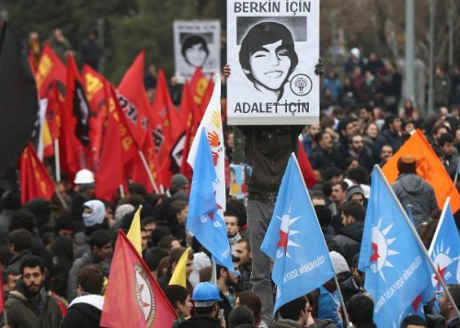
There is, however, another potential front in Turkish politics. This is the spectrum of the variegated forces that created the people’s revolt
triggered by the Gezi Park events of last summer. It brings together all the modern forces of society that oppose reactionary AKP politics, from women and LGBT to environmentalists and the self-styled “anti-capitalist Muslims,” as well as a sector of the vanguard of the proletariat in its broad definition, the whole gamut of socialist parties and movements, the so-called “nationalists of the left” along with left-wing liberals, and, last but certainly not least, the millions, even tens of millions of Alevis, who are waging a struggle for their very survival in the face of the openly sectarian Sunni policies of Erdogan, both abroad in neighbouring Syria and at home. It is true that the first wave of the rebellion came to an end in late September 2013, but that the spirit is alive and the mass of people is ready to explode was proved palpably during the sad funeral procession of Berkin Elvan, the 14-year old boy who had been shot in his head by the police with a tear gas canister while buying bread for family breakfast during the Gezi revolt and died in mid-March, after 269 days of vegetation. A crowd of 500 thousand to one million angry people filled the streets of Istanbul and police reported that, overall, more than 2 million people came out in 53 of the 81 provinces of the country. (Compare this to the official figures for the Gezi rebellion when, according to the extremely conservative statistics of the Ministry of the Interior, three and a half million people came out in 80 of the 81 provinces.) People are so enraged with all that has happened that the mass movement may be triggered off any moment by any kind of event.
To work for this is the categorical duty of all socialists. We find ourselves in the minority in the movement for criticizing the futile prioritization of electoral politics at the expense of a mass mobilization strategy. The latter strategy is the only one capable of moving Turkey beyond the reactionary framework to which both ruling class coalitions discussed above condemn Turkey. Only an independent class policy can help overcome the problems faced by the working classes and the oppressed. If a revival of the Gezi spirit can be united with class politics, which we believe will be on the order of the day in the near future because of the impending economic crisis, and the struggle of the Kurdish people, then this will be the prelude to a full emancipation of the labouring and oppressed population.
In any case, if and when Erdogan falls, the people will surely come out into the streets in their hundreds of thousands or even millions in every corner of the country. That is when a real festival of the people promises to begin. •


